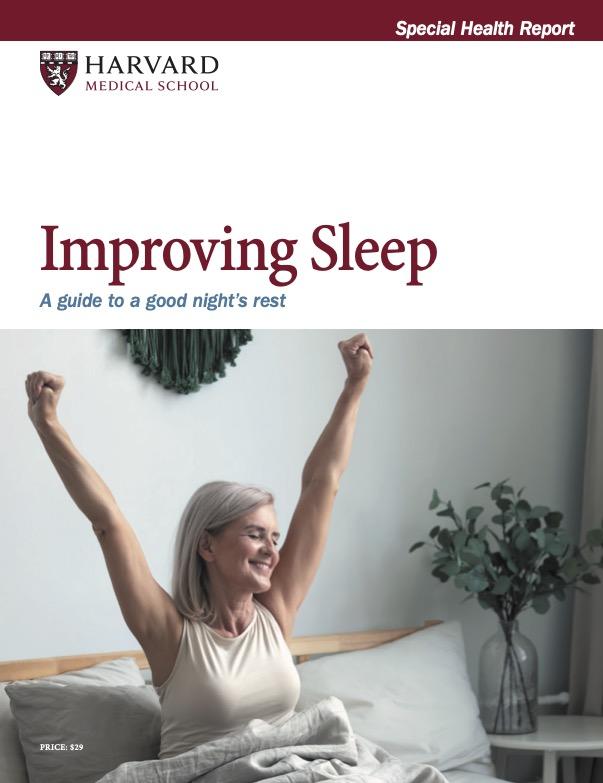Short on slumber
Sleep deprivation is more common than ever, but it can lead to far-reaching health problems.
- Reviewed by Toni Golen, MD, Editor in Chief, Harvard Women's Health Watch; Editorial Advisory Board Member, Harvard Health Publishing; Contributor
 If you use an alarm clock to wake up, it's a good bet you're sleep deprived. But what if you feel fine when that buzzer, bell, or blast of music rouses you? You're probably still not getting all the sleep you need — the fundamental definition of sleep deprivation — or you wouldn't have required the jolt. You would have woken up by yourself already.
If you use an alarm clock to wake up, it's a good bet you're sleep deprived. But what if you feel fine when that buzzer, bell, or blast of music rouses you? You're probably still not getting all the sleep you need — the fundamental definition of sleep deprivation — or you wouldn't have required the jolt. You would have woken up by yourself already.
"You can keep eating when you're not hungry, but you can't keep sleeping if you're not tired," says Dr. Elizabeth Klerman, a professor of neurology at Massachusetts General Hospital and the Division of Sleep Medicine at Harvard Medical School.
Most adults need seven to nine hours of sleep each night, according to the National Sleep Foundation, but more than 35% of American adults report consistently sleeping less than seven hours. Moreover, nearly half of Americans say they feel sleepy during the day between three and seven days a week — meaning they're likely not getting enough nighttime rest. Women have particular problems with getting sufficient sleep, regardless of how much time we spend in bed; our lifetime risk of insomnia (difficulty falling or staying asleep) is up to 40% higher than that of men.
And things are only getting worse. "When we examine the data that tell us how much people have been sleeping over the last century, it's clear we're sleeping less and less," says Dr. Ina Djonlagic, a neurologist at the Sleep Disorders Center at Harvard-affiliated Beth Israel Deaconess Medical Center.
Being short on slumber can make us dopey, sluggish, cranky, and forgetful. But consistently getting less sleep than we need can lead to serious health problems that go far beyond a day's bad mood. "Sleep deprivation affects basically everything," Dr. Klerman says.
Reasons for poor sleep
Why aren't many of us sleeping enough? Some reasons are habit-based and therefore controllable. Often, Harvard experts say, we simply don't set aside enough time for sleep and allow work or other commitments to intrude.
"For some parents, bedtime is finally their 'me' time when they start to watch movies and do things they enjoy at the expense of sleep," Dr. Djonlagic says. "And it's not just bedtime procrastination; some people get up really early to go to the gym to have time for themselves."
Some also carry a misguided sense of pride in not "needing" sleep, boasting about how little they get — as if it's a virtue. "It's almost like a competition, and there's certainly this idea that if you sleep a lot you're a bit lazy and less productive," Dr. Djonlagic says.
But some contributors to a lack of shuteye are indeed out of our control, making sound sleep an unattainable dream. They include
- pregnancy
- menopause-related night sweats
- certain medications
- sleep disorders such as insomnia, sleep apnea, and restless legs syndrome
- ailments such as chronic pain, cancer, depression, or dementia.
Threats to health and safety
Whatever the cause, skipping shut-eye can be disastrous. "The immediate effect of sleep deprivation is a lack of alertness that can translate into more accidents in cars and other situations," Dr. Djonlagic says. About one in 25 adults falls asleep at the wheel each month, according to the CDC, while 6,000 fatal car crashes per year are due to drowsy driving.
And a new analysis provides eye-popping insight into how our health can suffer for decades to come. Published online Oct. 18, 2022, by the journal PLOS Medicine, the study showed that healthy 50-year-olds who sleep five hours or less each weeknight have a 30% higher risk of developing two or more chronic health conditions over the next 25 years compared with peers who sleep seven hours. By age 70, that risk climbs to 40% in those with the same scanty sleep pattern.
The study tracked nearly 8,000 British people from 1985 to 2016, none of whom had multiple chronic diseases at the start. A quarter-century later, researchers observed far higher risks of multiple conditions such as diabetes, cancer, coronary artery disease, heart failure, chronic obstructive pulmonary disease, kidney or liver disease, depression, dementia, Parkinson's disease, and arthritis in those who logged five hours of sleep or less.
Other recent research has zeroed in on sleep deprivation's effects on specific conditions. A study published online Nov. 2, 2022, by The Science of Diabetes Self-Management and Care suggests that people who report trouble sleeping are likelier to have markers—including higher cholesterol, greater body weight, and more inflammation—that contribute to diabetes. The study involved more than 1,000 Australian adults (average age 45).
There's also a higher risk of obesity among people averaging less than seven hours of sleep each night, according to a 2018 study in the journal BMJ Open Sport and Exercise Medicine. "Hunger hormones are involved, but when we're tired or sleepy we gravitate more to foods that give us energy, such as carbohydrates," Dr. Djonlagic says.
Our brains suffer, too. A study published in the November 2022 issue of Sleep that tracked more than 26,000 people ages 45 through 85 over three years showed those with insomnia faced greater risks of memory decline and dementia. "We know there's a link between sleep and our ability to flush out brain toxins, such as amyloid proteins associated with Alzheimer's disease," Dr. Djonlagic says. "Sleep deprivation may also speed up the process for those destined to develop the disease."
Don't despair if you tend to operate on a sleep deficit. It might not be too late to turn around any deprivation-driven health trends, Dr. Klerman says. "I want to believe if you start getting more sleep now, your body will begin repairing all the things that happened when you didn't sleep enough," she says.
Tactics for sounder sleep
Sleep feels good, so deciding to get more should theoretically be easy. But many of us don't cultivate the environment and set of habits known as sleep hygiene that promote sounder slumber. To accomplish that, Harvard experts offer these tips.
Keep a consistent schedule. Go to bed and wake up at the same time each day. But if there are nights you haven't slept enough before rising for school or work, it's okay to allow yourself to sleep longer on mornings when that's possible, Dr. Klerman says.
Exercise earlier in the day. For some, exercising too close to bedtime can keep them up or fuel insomnia.
Ease into sleep. "We're good at helping little children do this by reading books and taking warm baths, but it's helpful for adults too," says Dr. Djonlagic. "Light and stimulation are the biggest enemies to getting to sleep on time. Put everything aside and read a book in dim light or do something relaxing."
Use your bed for only two things. "You should associate your bed with sleep or sex, not paying the bills," Dr. Klerman says.
Ramp down caffeine use. This stimulant has a half-life of five hours in most adults, meaning your body will eliminate about half the caffeine you've consumed in that time, according to the American Academy of Sleep Medicine. It's wise to avoid it after lunchtime.
Why do we sleep?If sleep isn't a biological necessity, it's the biggest mistake evolution ever made. So said Allan Rechtschaffen, a pioneer of modern sleep research. His musings make sense, since by sleeping we spend about one-third of our lives inert, not reproducing or being productive in any other way. So why do we sleep? Scientists don't yet fully know the answer. But they do know that while we lie quiet, our brain and body are busy. Research has shown that this period of seeming inactivity serves to fine-tune physiological fundamentals such as metabolism, immune function, and more. We also process memories and wake feeling ready to focus on the day ahead. "We think sleep serves multiple purposes," says Dr. Ina Djonlagic, a neurologist at the Sleep Disorders Center at Beth Israel Deaconess Medical Center. "It's almost like your body is processing things on a deeper level." |
Skip the nightcap. Alcohol's sedative effects help us fall asleep quickly — but that effect wears off later in the night, making us more likely to toss and turn. More than one alcoholic drink each day lowers sleep quality in women by nearly 40%, according to the National Sleep Foundation.
Put away devices. Blue light from cellphones, tablets, and computers can interfere with our circadian rhythm, the internal body clock that regulates sleep-wake cycles. Blue light–filtering glasses can help stem these effects, as can built-in filters available on some devices. Better yet, avoid using electronic devices for an hour or longer before bedtime.
Let natural light in. Don't use blackout shades in your bedroom, Dr. Klerman advises. "If you want to stay in sync with the world, you want the morning light to help you wake up," she says. Room-darkening shades can be helpful for people with chronic insomnia, however.
Avoid using sleep aids for more than a night or two. It's tempting to take sleeping pills, but they carry major risks—especially as we age and are more prone to falls. They should only be used for a specific short-term reason (such as problems sleeping after a stressful event). Taken for longer, sleep aids tend to lose effectiveness within a few weeks and can backfire, disrupting sleep. People with chronic sleep problems can try a form of cognitive behavioral therapy that's geared toward insomnia (called CBT-i), "which has been shown to work better than drugs," Dr. Klerman says.
Another proactive step: try tracking your vacation sleep habits — the amount of shut-eye you log when you're not working for a week or two and are unencumbered by normal routines. "That's usually how much sleep you actually need," Dr. Djonlagic says. "Unfortunately, few people will make it a priority to get that amount during normal times."
Image: © Tetra Images/Getty Images
About the Author

Maureen Salamon, Executive Editor, Harvard Women's Health Watch
About the Reviewer

Toni Golen, MD, Editor in Chief, Harvard Women's Health Watch; Editorial Advisory Board Member, Harvard Health Publishing; Contributor
Disclaimer:
As a service to our readers, Harvard Health Publishing provides access to our library of archived content. Please note the date of last review or update on all articles.
No content on this site, regardless of date, should ever be used as a substitute for direct medical advice from your doctor or other qualified clinician.
















